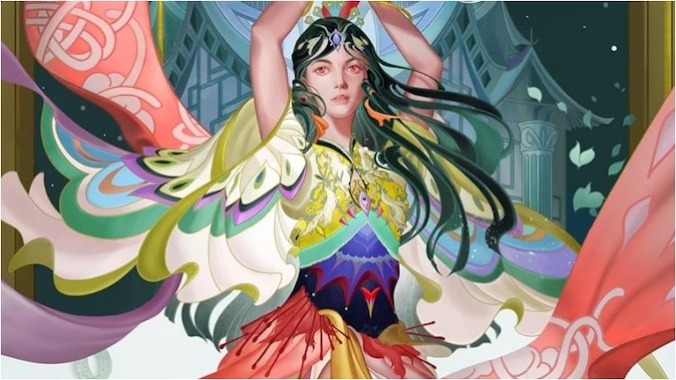In To Gaze Upon Wicked Gods, a Heroine Puts Survival Above All—But at What Cost?

To Gaze Upon Wicked Gods is Molly X. Chang’s debut novel, and it’s had quite the journey to publication. First, Chang was one of the victims of Cait Corrain’s Goodreads review bombing scandal, in which the aspiring fantasy author created a squad of bot accounts to downvote and disparage other 2024 debuts and boost her own release. Then, mere months later, Chang and her book became the source of another Book Twitter kerfuffle when a series of anonymous reviewers declared her debut a “colonizer romance” and accused its author of doxxing reviewers and allegedly “invading” reviewer spaces. That most of these claims seem…let’s just call them questionable at best, it’s led to a lot of unfortunate buzz around a fantasy debut that seems to be being defamed and criticized for reasons that have little to do with the content of Chang’s story. Which is, by the way, deeply felt and features a unique perspective that’s genuinely trying to do something different in the YA fantasy space. To Gaze Upon Wicked Gods doesn’t always succeed, but it’s an intriguing, if admittedly imperfect, effort.
The story is set in Pangu, a magical world where certain individuals—known as Xianlings—can command various elements and other aspects of the natural world. The kingdom of Er-Lang has spent several generations living under the boot of a conquering people known as the Romans. (One does wish Chang had chosen virtually any other name for her invaders, but here we are.) A people of science, the Romans have advanced heavy weaponry, airships, and portal technology, tools which overwhelmed the magic users of Yang Ruying’s kingdom in a single day and left their country virtually enslaved to their invaders.
Ruying has grown up under the Roman occupation, constantly trying to hide her magical gift—she has been “blessed by Death” and can kill by ripping the life force from others—and avoid catching the notice of enemy soldiers. She and her family—an elderly grandmother and a drug-addicted sister flirting with joining the mysterious Phantom’s rebellion—survive by selling heirlooms and trading on favors to those they once counted on in better times. But when a desperate theft brings Ruying and her unique abilities to the attention of the youngest Roman prince Anthony Augustus, she becomes his personal assassin in exchange for a promise of protection and safety for her family.
Though the blood on her hands haunts her, Ruying finds herself intrigued by Anthony’s promises that her killings serve a purpose. According to him, they’re all part of a larger plan that will help him ensure a peaceful, more equitable future for both their worlds if he manages to secure the throne. The question, of course, is whether he can be trusted—and whether Ruying can trust the connection she feels growing between the two of them, or if she’s just desperate to feel seen and valued for her belief that her people would be better served by peace, even if it comes at the cost of occupation.
-

-

-

-

-

-

-

-

-

-

-

-

-

-

-

-

-

-

-

-

-

-

-

-

-

-

-

-

-

-

-

-

-

-

-

-

-

-

-

-








































